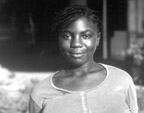






| Le bouillon d'awara (Awara Soup)
The film's title comes from a local Easter specialty, a kind of gumbo based on the fruit of the awara palm, which functions as the film's symbol for Mana's polyglot society. There are as many recipes for awara soup as there are people and, "it can include virtually any ingredient in the world." The cooks warn if it's made too quickly it can cause serious indigestion, but once you've tasted it you'll return. As in the producers' previous documentary on Malagasy oral tradition Angano...Angano... (also available from California Newsreel), the characters narrate their own stories, the stories of their own Guyana. We meet descendants of indigenous Galibi Indians, of Bushnegroes who escaped slavery in the jungles, of mixed race Creoles who remained in the French towns and of Javanese contract rice laborers, as well as more recent immigrants, Taki Taki-speaking refugees from political strife in next-door Surinam, Brazilian migrant workers and Hmong farmers resettled after the Vietnam war. Awara Soup comments subtly on the xenophobic debate raging in France (and this country) over immigration. A Javanese healer, born in Surinam, now a French citizen, observes: "People are like birds; they go where they can eat. For them, there is no Surinam, no Guyana." Awara Soup
suggests that the key to Guyanese harmony may be its fluid sense of
national identity, neither assimilationist or traditionalist but inclusive
and dynamic. In this frontier society, everyone may have a different
past but shares the hope of a prosperous future. Rather than an ethnographic
film on a remote outpost, Awara Soup points towards an era of
increasingly porous borders where more and more of us are immigrants
and the only culture we have in common is change. |
"Innovative...It's
a pleasure to see an affirming film on a present-day multi-cultural
encounter." "A delightfully
evocative film... Like all good art, Awara Soup is not polemic. It demonstrates
rather than dictates the pleasures of multi-cultural social life." "An excellent
film for stimulating discussion about important issues of (trans-) national
identity and pluriethnic world-in-the-making that go way beyond most
American platitudes about multiculturalism." "Whimsical rather
than sentimental, socially incisive rather than righteous, respectful
rather than idealizing - it hits the right note...A frank and hopeful
assessment of a multi-ethnic society." Producer: Marie
Clémence Blanc-Paes Video
Purchase: $195
|
 Awara
Soup introduces us to what must be one of the world's most multi-cultural
communities, a global village in the backcountry of French Guyana, an
overseas department of France perched on the edge of South America.
Three hundred years of world history intersect in Mana, a town where
1500 people speak 13 different languages and live together in remarkable
harmony. Awara Soup reveals that "creolization" is not just an
historical artifact but a dynamic, on-going process, encompassing more
and more of the world's people.
Awara
Soup introduces us to what must be one of the world's most multi-cultural
communities, a global village in the backcountry of French Guyana, an
overseas department of France perched on the edge of South America.
Three hundred years of world history intersect in Mana, a town where
1500 people speak 13 different languages and live together in remarkable
harmony. Awara Soup reveals that "creolization" is not just an
historical artifact but a dynamic, on-going process, encompassing more
and more of the world's people.